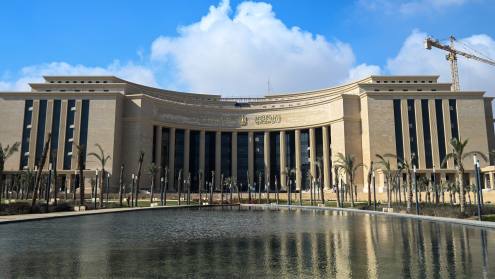Q: What are ADIB’s strategic priorities for the remainder of 2023 and into 2024?
A: We have a clear vision to be the world’s most innovative Islamic bank. We will continue to play to our strengths to build a competitive advantage and we have an established governance framework that ensures effective execution and risk management.
ADIB’s strategy is predicated on our response to several factors affecting the global economy and the region: economic mega-trends such as the rates environment, excess liquidity and inflation; and trends in the banking sector, such as increasing competition, digital adoption and disruption, and the evolving regulatory environment.
We are also digitising at scale with investments in technology and operational capabilities to improve customer experience and drive efficiencies across the business. We will position ADIB as a mobile-first bank with the best digital experience that includes the fastest and most innovative products and services.
Q: ADIB has achieved success with digital products including Amwali and digital onboarding of small and medium-sized enterprises via the use of Emirates Face Recognition technology. What are your digital priorities going forward?
A: The substantial growth in mobile banking usage and the fact that more than 50% of personal finance products are [available] digitally on our mobile app indicates a strong demand for mobile-based services. We strive to maintain and enhance the user-friendly interfaces and functionalities of our mobile app to cater to customers’ evolving needs, thereby ensuring seamless access to financial services.
ADIB’s commitment to expanding its digital service portfolio is evident from the introduction of 33 new services in 2023. This trend will continue as the bank aims to meet diverse financial requirements and cater to a broader range of customer needs.
Also, given the bank’s reported surge in initial public offering (IPO) subscriptions through its mobile app, ADIB will further emphasise its role as a digital facilitator for financial transactions. This includes facilitating customer participation in sharia-compliant IPOs, as well as providing secure and user-friendly transaction capabilities. Supporting the UAE government’s capital market expansion strategy will remain a priority in this regard.
Q: Are retail customers — of all backgrounds — becoming more interested in sharia-compliant finances in the markets in the UAE and across your footprint?
A: ADIB’s own experience in the UAE shows that Islamic finance can gain wide appeal beyond a purely Muslim customer base, and we are seeing an increase of expats within our customer portfolio. This reflects the fact that customers want to bank with an organisation that promotes ethical products and services, provide the right advice, help individuals and companies solve financial problems, and is transparent on fees and charges.
This is an area of the market that Islamic financing naturally fills and can look to grow in coming years. However, the industry cannot afford to be complacent. It is vitally important that we remain focused on providing competitive, inventive and high-quality services. With this in mind, we continue to place great emphasis on our digitisation strategy with consistent, high-value offerings.
Q: Much has been written about the overlap between sharia-compliant and environmental, social and governance (ESG) financing. What part does Islamic finance have to play in helping to achieve the UN’s Sustainable Development Goals (SDGs) in the coming years?
A: Islamic finance has the potential to play an important role in supporting the implementation of the SDGs in the coming years. Islamic finance inherently aligns with these values and principles, making it well-suited to sustainable finance initiatives.
ADIB’s commitment to a sustainable future is integrated into its five-year strategy, encompassing all aspects of ESG. This commitment not only supports the UAE SDGs but also contributes to the [UAE’s] national goal of achieving net-zero emissions by 2050.
[Our] corporate strategy includes a dedicated ‘Sustainable Future’ pillar, reflecting the bank’s commitment to empowering sustainability journeys for itself, its customers, and communities. This pillar emphasises the bank’s focus on sustainable finance as a key driver of its operations.
Q: What can financial institutions do to avoid charges of greenwashing in their sustainability initiatives?
A: Financial institutions play an important role in financing new growth opportunities that drive transformation towards a more sustainable future. To fulfil this role effectively and avoid greenwashing, they must prioritise transparency, accountability and authenticity in their ESG initiatives. By doing so, they can build trust with stakeholders and contribute genuinely to a sustainable global economy.
Financial institutions have the unique capability to channel capital towards projects and businesses that align with ESG principles. This capital allocation can accelerate the transition to cleaner energy, more equitable societies and responsible governance practices. By acting as catalysts for sustainable growth, financial institutions not only mitigate risks associated with greenwashing but also contribute to a more environmentally conscious, socially responsible and economically viable future.













